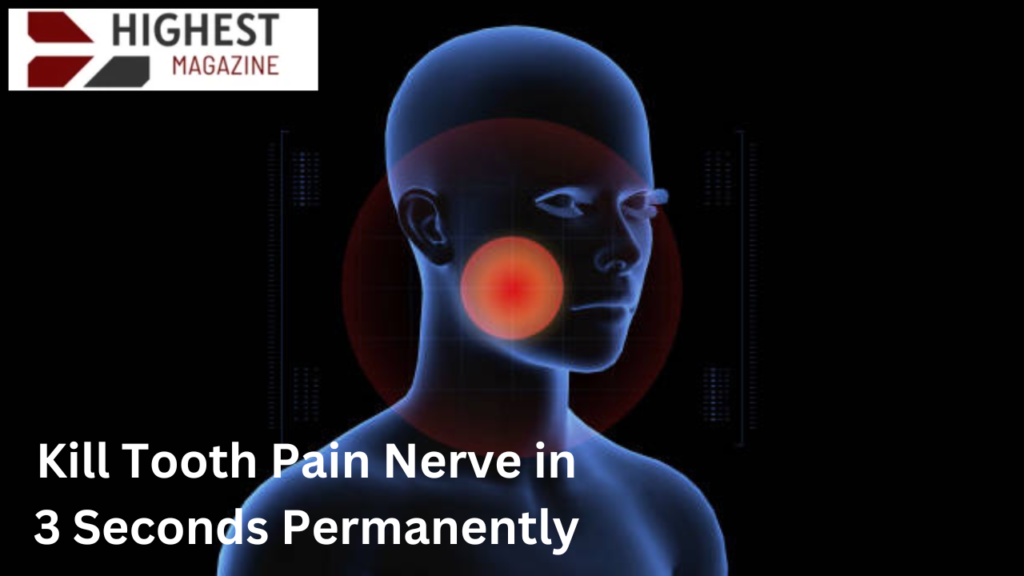Tooth pain is one of the most excruciating and frustrating experiences anyone can face. When a nerve in the tooth is exposed or damaged, it can lead to relentless throbbing pain that disrupts your daily life. You may wonder if there is a way to permanently kill tooth pain nerve in 3 seconds. While this idea sounds appealing, it’s essential to approach such claims and seek professional advice cautiously. This article will explore the truth behind this concept, discuss potential remedies, and explain the steps to alleviate tooth pain effectively.
What Causes Tooth Nerve Pain?
Tooth nerve pain typically arises from irritation or damage to the dental pulp, the soft tissue inside the tooth that contains nerves and blood vessels. Common causes include:
- Tooth Decay: Cavities that reach deep into the tooth can expose the nerve, leading to severe pain.
- Dental Trauma: Injuries such as fractures or chips can expose or damage the nerve.
- Infections: Abscesses or gum infections can cause inflammation and pressure on the nerve.
- Bruxism: Grinding your teeth can wear down enamel and irritate the underlying nerve.
Understanding the root cause of your tooth pain is crucial for effective treatment and relief.

The Reality of Killing a Tooth Pain Nerve in 3 Seconds
The claim to permanently kill tooth pain nerve in 3 seconds may sound promising, but it is not scientifically or practically feasible. Tooth pain relief methods, whether at home or through professional care, take time to work and address the underlying issue. Here are some facts to consider:
- Temporary Relief vs. Permanent Solution: Most quick remedies provide temporary relief by numbing the area or reducing inflammation. To permanently stop tooth pain, the underlying cause must be treated.
- Professional Dental Procedures: Procedures like root canals can remove the damaged or infected nerve tissue and provide a permanent solution. However, these treatments take more than a few seconds and require a dentist’s expertise.
Temporary Remedies for Tooth Pain Relief
While permanent relief requires professional care, several methods can help manage tooth pain in the short term. These remedies may not “kill the nerve” instantly but can provide significant comfort:
1. Over-the-Counter Pain Relievers
Medications like ibuprofen or acetaminophen can help reduce inflammation and pain. Always follow the dosage instructions on the packaging.
2. Cold Compress
Applying a cold compress to the affected side of your face can numb the area and reduce swelling. Use it for 15-20 minutes at a time.
3. Saltwater Rinse
A warm saltwater rinse can help cleanse the mouth, reduce bacteria, and soothe inflammation. Mix a teaspoon of salt in a cup of warm water and swish it around your mouth.
4. Clove Oil
Clove oil contains eugenol, a natural anesthetic, and antibacterial agent. For temporary relief, apply a small amount to a cotton ball and place it on the affected tooth.
5. Garlic Paste
Garlic has antimicrobial properties and can help reduce pain and infection. Crush a clove of garlic into a paste, apply it to the affected area, and rinse after a few minutes.
The Importance of Seeking Professional Help
While home remedies can provide temporary relief, they are not substitutes for professional dental care. To permanently address tooth pain, consult a dentist who can diagnose the issue and recommend the appropriate treatment. Standard dental procedures for nerve-related tooth pain include:
- Root Canal Therapy: Removes the infected or damaged nerve tissue and seals the tooth to prevent further infection.
- Tooth Extraction: In severe cases, removing the affected tooth may be necessary to eliminate pain and prevent complications.
- Filling or Crown: Repairs cavities or damage that may be irritating the nerve.
Preventing Tooth Nerve Pain
Prevention is always better than cure. To reduce the risk of experiencing severe tooth pain, follow these tips:
- Maintain Oral Hygiene: Brush twice a day, floss daily, and use mouthwash to keep your teeth and gums healthy.
- Avoid Sugary Foods and Drinks: Excess sugar can lead to cavities and tooth decay.
- Visit Your Dentist Regularly: Regular check-ups and cleanings can help identify and address issues before they become severe.
- Wear a Mouthguard: If you grind your teeth at night, a mouthguard can protect your enamel from damage.

Also Read: The Ultimate Guide to the Perfect Puzzle Table
Final Reflections
While the idea of a method to permanently kill tooth pain nerve in 3 seconds might be enticing, it’s essential to understand that lasting relief requires proper treatment and care. Temporary remedies can help manage pain but do not address the root cause. Consulting a dental professional is the best action to restore and maintain your oral health. By prioritizing prevention and seeking timely care, you can avoid the agony of tooth nerve pain in the future.
























